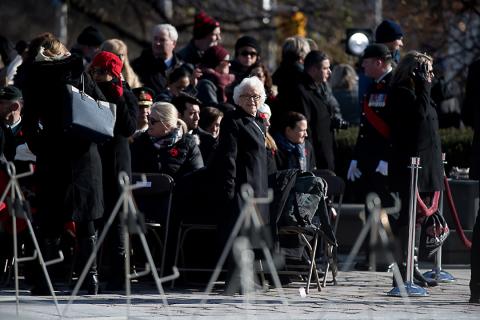
When Elsa Lessard’s older brother taught her Morse code as a young girl, she never could have imagined that she would eventually use this skill to intercept coded radio messages from German U-boats during the Battle of the Atlantic.
When the war started, Lessard was 17 years old and attending high school in Ottawa, Ontario. Once she graduated, she joined the war effort by working for the Federal department of Attendance, Allowance and Assigned Pay. This department was responsible for sending soldiers’ salaries to their families when they were posted overseas.
“I took special training in Morse code, which I already knew, because my brother had taught me when I was a young lady.”
In 1942, the Navy established the Women’s Royal Canadian Naval Service (WRCNS) and started to recruit women. Elsa Lessard had grown up in a Navy family—her eldest brother joined when she was six years old. Recognizing the importance of military service and having been inspired from a young age, she decided to enlist in 1943. After completing her training in Galt, Ontario, now known as Cambridge, she took special training in Morse code. “I took special training in Morse code, which I already knew, because my brother had taught me when I was a young lady.”
Approximately 7,000 women joined the Wrens during the Second World War. They performed a variety of roles at home and abroad. About 700 women, including Lessard, were known as the “listeners.” They spent hours listening to and transcribing secret German radio messages.
Elsa Lessard served at two secret stations: one located south of Ottawa and the other located on a farm close to a town named Gunningsville in New Brunswick.
“The Navy had this secret station [in New Brunswick] on a farm belonging to a local farmer, and he owned a hill on the opposite side of the road,” she describes. The Navy built a special tower on the property where they could listen in on the enemy’s communications. “That’s why we were hidden in a station up there, because from the tower, we could intercept.”
During the Battle of the Atlantic, Lessard listened for encrypted radio messages from German U-boats. Eventually, the messages would be sent to Bletchley Park in England where they were used to break Germany’s Enigma code. Once decoded, the messages were used to find the positions of German U-boats that were tracking and sinking Allied supply ships across the Atlantic. Cracking the German code gave the Allies an advantage.
The operation at Bletchley Park was top secret and everyone, including the Wrens, were sworn to secrecy. Details of the intelligence operation at Bletchley Park only started to be revealed many years later.

Elsa Lessard, stands in front of a plaque honouring the Women’s Royal Canadian Naval Service, at the Canadian War Museum.
Photo Credit: Canadian War Museum
Since the war ended, Lessard—who just celebrated her 98th birthday—has been a devoted participant in commemorative events. She attends these events in honour of those who died during the Battle of the Atlantic. “It’s to remember the men who didn’t come back. I’m not there for myself,” she says. “I remember all the time. I remember knowing all the men who didn’t come back.”
“I remember all the time. I remember knowing all the men who didn’t come back.”
Lessard also has a passion for increasing public awareness of the WRCNS. “I made a point when I discovered that men didn’t know women had been in the war, 25 years after the war… then I said, before I left the planet, the Canadians would know there had been women in the war,” she says.
“[…]before I left the planet, the Canadians would know there had been women in the war! ”
Since 1975, Lessard has been featured in national news stories and been a guest speaker at schools, community clubs, the Canadian Security Intelligence Service, museums and more. In 2008, Lessard was awarded the Minister of Veterans Affairs Commendation for her work.
In honour of the 75th anniversary of the end of the Second World War, Elsa Lessard is featured as a Face of Freedom. You can also hear her story first hand by listening to her episode of our Faces of Freedom podcast.
Veteran Elsa Lessard passed away on 22 July 2025. She had celebrated her 103rd birthday with friends and family members on July 2.